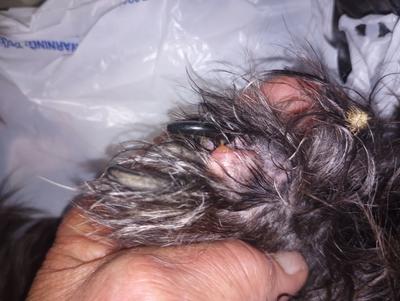Leg Skin Hardening in Senior Dog
by Lore' Atteberry
(Fort Worth, Tx. Usa)
My dog's skin is getting worse. it started on one leg now it spreading fast. She is 20 years old other wise in good health. Her one leg is hard the whole leg.
Editor Suggestion For Causes of Dog Skin Hardening on Leg in Senior Dog
Hi Lore'
So sorry to hear about your dog's skin problem.
While I can provide some general advice based on your description, please remember that it's critical to contact a veterinarian for diagnosis and treatment.
Here are a few possible issues that could be happening, but none of these should be used as a substitute for professional veterinary advice:
Dermatitis: This could be a bacterial or fungal infection on the skin. If it's spreading fast, it's a sign that the dog's immune system might not be responding adequately, and the infection is growing.
Allergies: Sometimes dogs can have allergic reactions to foods, environmental factors like pollen, or flea bites. This can lead to skin inflammation and discomfort.
Parasitic Infections: Fleas, mites, and ticks can cause skin issues and spread from one part of the body to another.
Autoimmune diseases: Certain autoimmune diseases can cause skin problems in dogs. These conditions occur when the body's immune system attacks its own cells.
Cancer: Skin cancer can also manifest as changes in the skin, although it's less likely to spread fast like you've described.
The hardness in the leg is concerning, and it might suggest something more serious like a tumor, a deep infection, circulatory problems, or another internal issue. Sometimes, skin changes can be a sign of internal disease.
Given the age of your dog, and the symptoms you're describing, it's really important to get her checked out by a vet as soon as possible. They can perform a physical examination and may recommend diagnostic tests like a skin scrape, blood tests, or biopsy to help figure out what's going on. Make sure to tell the vet about any other symptoms you may have noticed, like changes in appetite, behavior, or bathroom habits. These could provide important clues about what's happening.
Please keep us up to date on your dog's condition once you get a specific diagnosis from a Vet.
Best,
Jeff
Editor and Publisher
Dog Health Guide
Join in and write your own page! It's easy to do. How? Simply click here to return to Skin.


